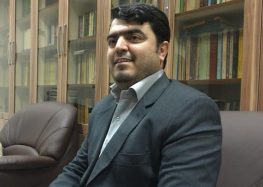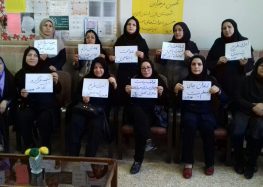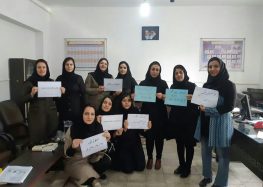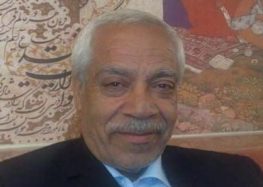Iranian Teachers’ Rights Activist Facing 14 Years Behind Bars for Peaceful Advocacy

Imprisoned teacher’s rights activist Mahmoud Beheshti-Langroudi is facing 14 years behind bars in Iran after the confirmation of his latest prison sentence, his son told the Center for Human Rights in Iran (CHRI).
On September 25, 2017, Beheshti-Langroudi’s lawyer received notice that Branch 36 of the Appeals Court upheld a five-year prison sentence issued against the activist for the charges of “assembly and collusion against national security” and “propaganda against the state.”
“My father is demanding that these unreasonable convictions be suspended until he is tried in an open court in the presence of a jury in accordance with Article 168 of the Constitution,” Abuzar Beheshti-Langroudi told CHRI.
The former spokesman for the Iranian Teachers’ Trade Association (ITTA), Beheshti-Langroudi was taken to Evin Prison on September 12, 2017 to begin serving two sentences (four and five years)—again for the charges of “assembly and collusion against national security” and “propaganda against the state.”
“In every case brought against my father there are charges such as participating in rallies or membership in banned organizations,” said Abuzar Beheshti-Langroudi. “But these charges are problematic because based on Article 27 of the Constitution, taking part in peaceful gatherings is legal. Also, the ITTA has been operating under an official license since 1999 and has never been banned.”
Abuzar Beheshti-Langroudi also expressed concern that his father might go on hunger strike to protest the new conviction even while suffering from the impact of previous hunger strikes, including the loss of his gallbladder and part of his liver.
From April to May 2016, Beheshti-Langroudi went on a 22-day hunger strike that led to his release on May 11, 2016, pending the outcome of his appeals.
The activist was first arrested on March 14, 2007 for participating in a rally with thousands of teachers in front of Iran’s Parliament aimed at protesting new state employment regulations. For that he was handed a four-year suspended prison sentence for the charges of “assembly and collusion against national security” and “propaganda against the state.”
In April 2010 he was arrested again for protesting the mistreatment of his imprisoned colleagues, including Rasoul Bodaghi, after they were arrested by agents of the Intelligence Ministry, and was held in solitary confinement in Evin Prison for two months before being released on bail.
Beheshti-Langroudi’s trial, which lasted less than eight minutes, was held in June 2013 at Branch 15 of the Revolutionary Court presided by Judge Abolqasem Salavati, who sentenced him to five years in prison for “colluding against national security” and “propaganda against the state.”
In September 2015, Beheshti-Langroudi was arrested a third time by the Islamic Revolutionary Guard Corps’ (IRGC) Intelligence Organization for his peaceful activities and a year later sentenced to another five years in prison for “colluding against national security” and “propaganda against the state.”
Until his transfer to prison on September 12, the labor activist was sent numerous summons from the prosecutor’s office threatening to confiscate his security deposit unless he reported to prison to serve his convictions, his son told CHRI.
“Every week my father went to the prosecutor’s office and told the authorities that they would have to arrest him because he was not going to report to prison voluntarily,” said Abuzar Beheshti-Langroudi.
Labor activism in Iran is seen as a national security offense; independent labor unions are not allowed to function, strikers are often fired and risk arrest, and labor leaders are consistently prosecuted under catchall national security charges and sentenced to long prison terms.






